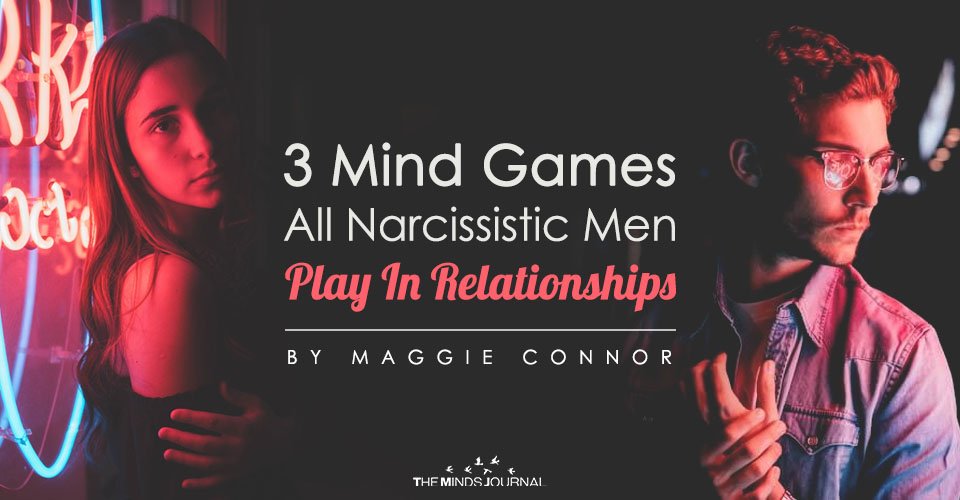Watch out for these signs.
How do you know if you’re with a narcissist? Let me count the ways!
First off, never make the error in thinking you can change them or help them. Unless you are a trained therapist and they have sought you directly for the purpose of assisting them with this mental disorder.
Make no mistake — this is a personality and mental disorder and a mental health care professional can help them, but only if they want the help.
Now that we have that clear… what are the games all narcissistic men play in relationships?
Game #1: Mr. Highly Inflated Sense of Self-Importance
Here is a scenario: Woman asks man if he would like to take a much-needed vacation with her. Man replies, “Do you have any idea what would happen if I were to leave my work at this time?”
Narcissists believe the whole world will fall apart without them… or at least they want you to believe this.
Generally, when they talk, there will be a lot of name dropping, boasting of what they are buying next, or where they went, what they did, with whom, how much money they spent. Rarely will they ask questions about you or your life.
The entire conversation is usually one sided and about them and their accomplishments. They tend to come off as conceited and pretentious. If a wait-person doesn’t seat them right away, they get impatient and may even get down right angry — even if the place is super busy!
The narcissist may be thinking, “Don’t they realize who I am!”
Game #2: Mr. Little to No Empathy for You or Anyone Else
Here is a scenario: Woman tells man about a college friend who is having a challenging time with cancer diagnosis. Man replies, “Well, serves him right, he smoked for 10 years before he quit. What did he expect?”
Here, we have zero empathy yet what makes it worse is the belittling of the person when they are already down. This is a huge warning sign you are with a narcissist.
Belittling others has the narcissist feel better about themselves. Yet, deep down they have a feeling of inferiority, though they act superior to all those around them.
Game #3: Mr. Fragile Self-Esteem
Here is scenario: Woman (who is a personal trainer) lovingly suggests a more effective way to do sit-ups, since she knows man wants a toned physique and knows he is doing sit-ups in way that will not deem him the results he wants.
Man replies, “What are you talking about? I do them perfectly and besides, I don’t even need to be doing them at all. I look great for a guy my age. Look at you, you could stand to lose some weight your self!”
Again, here we have someone who, rather than respond in a way that would show interest and/or show gratitude for the assistance, the narcissist responds in a critical, hurtful and demeaning way. This is classic narcissist behavior.
And there are other warning signs!
A narcissist is usually quite charming and quite intelligent. Oftentimes, they promise you the sun, moon and stars. They know how to push your buttons in a way that they ‘entrap’ you in their world so that you do what they want.
The moment you stop doing what they want, they get angry. When you choose to leave the relationship, they throw you away then go on to tell everyone they were victimized by you.
Though you may be a victim of narcissistic behavior, remember the narcissist has been victimized as well. They truly need help.
Truly rather than label people, I prefer to say, “Love the person, change the behavior.” Yet, remember that the person has to WANT TO CHANGE.
Loving that person doesn’t mean staying around for abuse. You can love the person and still leave. You can love them and help them to seek professional counsel.
If they choose not to get help, then you can (as my Grandmother would say) “run, don’t walk” to your happier future ahead! If they seek counsel, a great professional can truly help them.
In my experience there is a tremendous chance that the man imprinted narcissism at a very early age from a caregiver.
If you or someone you know and love have symptoms of narcissism seek professional counsel. Remember you are magnificent being of love and light!
Related Video – How A Narcissist Deals With A Break-up: The 6 Stages and After Effects
Become a Contributor at The Minds Journal
We Want To Hear Your Story. Share your work,thoughts and writings and we will make sure, it reaches the world! Submit Now
You May Also Like
- Narcissistic Relationships
- Why You Should Never Jump Into A New Relationship After Narcissistic Abuse
- The Three Phases of A Narcissistic Relationship Cycle: Over-Evaluation, Devaluation, Discard
- 3 Signs The Toxic People In Your Life Might Actually Be Adding to Your Relationship Problems









Leave a Reply
You must be logged in to post a comment.